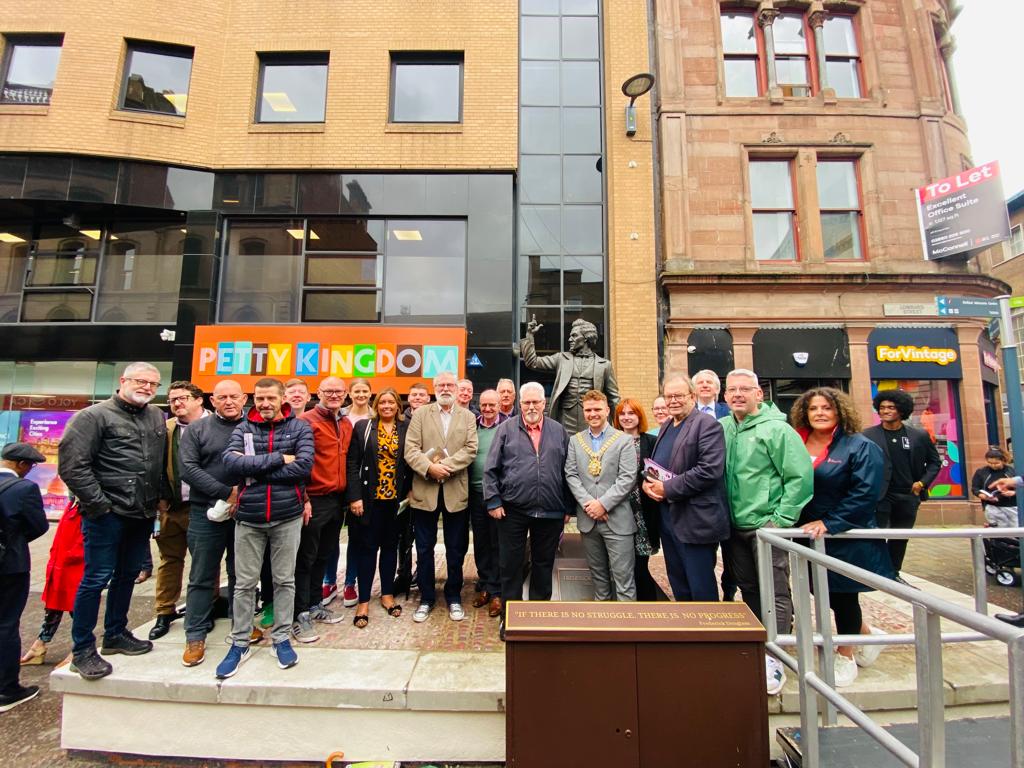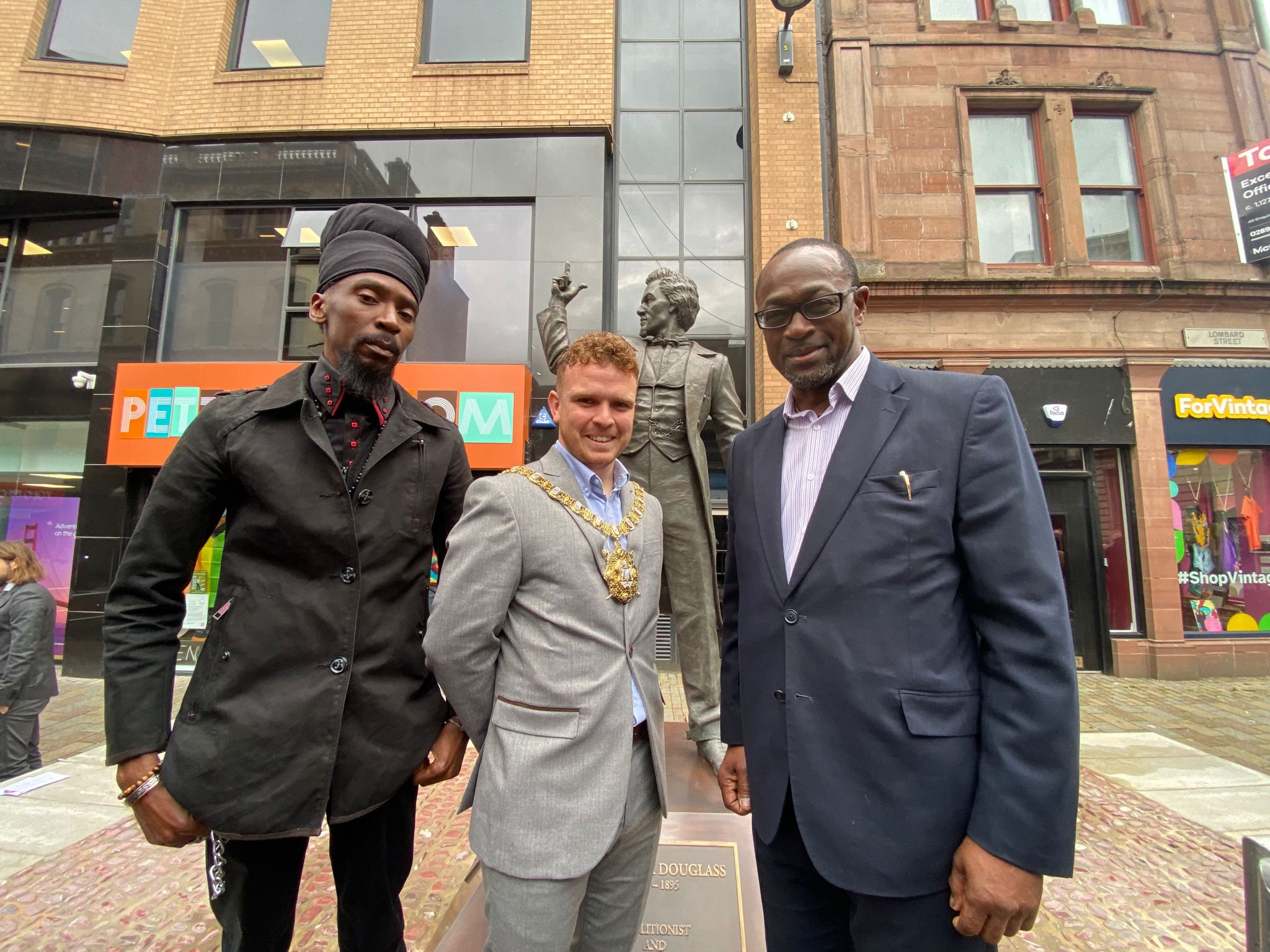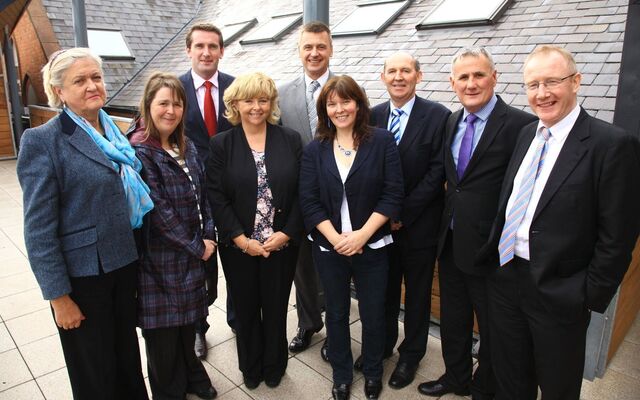The Irish American historian who has documented Frederick Douglass' links to Belfast says the unveiling today of a statute in honour of the escaped slave and abolitionist was a tribute to Belfast's tradition of promoting social justice.
Speaking at the unveiling of the statue outside Rosemary Street Presbyterian Church — where Frederick spoke in 1845 — Prof Christine Kinealy said she was delighted that Belfast "is the first place in Europe to erect a statue to this international icon of social justice".
"I hope Frederick's story - including the time he spent in the city - will inspire new generations of activists to agitate for inclusiveness and equity," said Prof Kinealy, who taught for a while at Queen's University Belfast and had a son born in the city. The Liverpool native, who now heads Ireland's Great Hunger Institute at Quinnipiac University in Connecticut, says she felt "honoured to be present on such a momentous occasion".
FIRST FOR BELFAST: Frederick Douglass Scholars from the US attending the unveiling of Frederick Douglass statue
Prof Kinealy has developed Frederick Douglass walking trails in Belfast, Cork and Dublin and is working with CIE Tours to put together an all-Ireland Douglass holiday itinerary for visiting Americans.
Professor Christine Kinealy who worked closely with the council spoke of Frederick Douglass’s four months in Ireland between 1845-46. These were transformative years for him. He was and is an inspirational leader pic.twitter.com/TZ8MjmOhUH
— Gerry Adams (@GerryAdamsSF) July 31, 2023
Frederick Douglass journeyed to Ireland in 1845-46 as part of a two-year speaking tour, making powerful speeches denouncing slavery. He found a warm welcome across Ireland and described his time in the country as "the happiest moments of my life". He former a close bond with Daniel O'Connell, 'the Liberator', and advocated for Irish freedom.
African Caribbean Association of Northern Ireland spokesperson Takura Donald Makoni urged the audience attending the unveiling to show the same respect to black people in Ireland today as they were showing to the legacy of Frederick Douglass.
"We must be mindful of hubris in this moment of unveiling this symbolic statue," he said. "As a society, we should show the same regard and reverence for the walking and living Africans, people of Africa descent and indeed all those from other parts of this one world we all share. As we accept this statue of a black man in Ireland we should show the same acceptance, compassion and support for those living and walking among us. The struggle continues."
“Knowledge unfits a child to be a slave.”
— Cllr. Séamas de Faoite (@SeamasBelfast) July 31, 2023
A privilege to be at the unveiling earlier of the first statue in Europe to commemorate American abolitionist Frederick Douglass, on Belfast’s Lombard Street. pic.twitter.com/9Mmbwh4laI
He added: "Let us reflect on the ideals that Frederick Douglass and his fellow-abolitionists strove for 178 years ago and ask ourselves if we have lived up to them, are we continuing his work earnestly or are we yet to understand its significance?"
Sculptor Alan Beattie Heriot told Belfast Media he had tried to capture the "power of the word" in the bronze sculpture which stands proudly at the junction of Rosemary Street and Lombard Street. "In my study of Frederick's life and work, it was clear to me that he understood the power and the strength of the word," he said.
The unveiling of a statue of Frederick Douglass in Belfast, 31.07.23. Frederick was an abolitionist, writer, and orator. He had escaped slavery in Maryland, and visited Belfast in 1845 and 1846. #FrederickDouglass Photos @stu_bailie pic.twitter.com/i8nuakaPdL
— Stuart Bailie (@stu_bailie) July 31, 2023
Lord Mayor Ryan Murphy welcomed the addition of the statue — commissioned and funded by Belfast City Council — to the Belfast streetscape. "In his day, Frederick was a true example of international solidarity, best encapsulated in his statement that 'the cause of humanity is one the world over'.
STATUESEQUE: Sinn Féin representatives, past and present, who supported the campaign to honour Frederick Douglass in Belfast
ACSONI Chairperson, Rev Livingstone Thompson said he was disappointed that there hadn't been more collaboration with the local black community in the creation of the artwork. "The statue is fixed eternally," he said. "It won't have benefitted from the perspective of African and Caribbean black people living in Ireland today and that is a travesty."
Thanks for sharing this, guys, it's so wonderful to see this statue of #FrederickDouglass unveiled today! 😍
— DouglassWeek (@DouglassWeek24) July 31, 2023
And what a beautiful statue it is! Well done to Alan Beattie Herriot! Outstanding job 👏 https://t.co/dM7WXZRXyF
Also attending the unveiling were Presbyterian ministers Rev Jack Lamb and Rev Bill Shaw, poet Nandi Jola, former Sinn Féin President Gerry Adams, Sinn Féin MLA Deirdre Hargey, Sinn Féin councillors Bronagh Anglin, Arder Carson, JJ Magee and Pádraig Donnelly, Senator Niall Ó Donnghaile, SDLP councillor Séamus de Faoite and former SDLP councillor Brian Heading.







